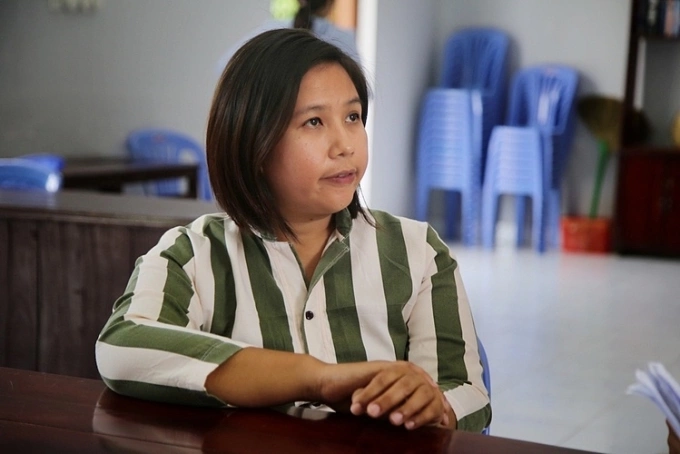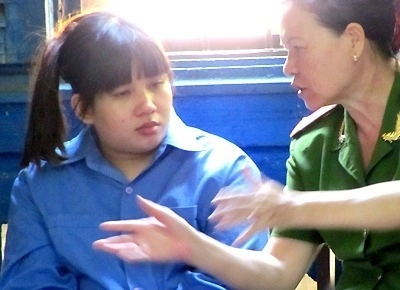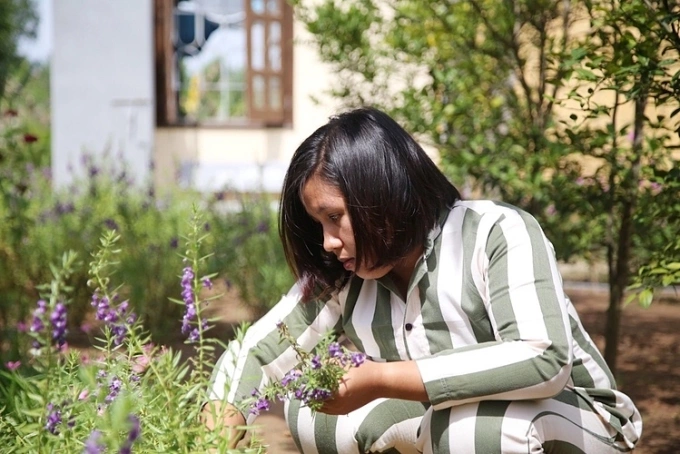Preeyanooch Phuttharaksa was a promising student following her dreams, but after a mistake she now finds herself ensnared in the confines of Vietnam’s Thu Duc prison.
Preeyanooch, now 34, picks up a withered leaf and some flowers fallen from the Angelonia trees at the entrance of Camp No. 1 in Thu Duc Prison in central Binh Thuan province.
It’s one of the final mornings of 2023, and this is one of the best activities available to detainees at Vietnam’s largest prison.
With tan skin and a high nose, Preeyanooch looks intelligent. She speaks in broken Vietnamese: “I’ve been here for 10 years. Everything is familiar now. Sometimes this feels like my home. But to be honest, I’m always tormented and regretful for the mistake that completely changed my life.”
 |
|
Preeyanooch in Thu Duc prison, Vietnam’s central Binh Thuan province. Photo by VnExpress/Quoc Thang |
She was born into a wealthy family in Bangkok’s Bang Khen District. Her father is a military officer, her mother is an entrepreneur. Her family nickname, Bow, doesn’t betray the meaning behind her Thai name Preeyanooch, which means proficient and smart.
After completing high school, the 18-year-old student enrolled in Sripratum University, Thailand’s most famous private university.
It was a logical step, as she always met her parents’ high expectations. Everything went smoothly and sweetly until her final year of college.
As a senior in university a decade ago, Preeyanooch met a woman on social media who was 2-3 months pregnant. They became digital pen pals because of their love of travel. They bonded over their desire to travel to Vietnam.
Preeyanooch had already visited almost every Southeast Asian country, so she then decided to visit Vietnam with her new online friend.
In March 2011, the two traveled to Hanoi for the first time on a multi-day tour. Six months later, Preeyanooch promised to help her new friend by “carrying her husband’s suitcase” from Africa to Ho Chi Minh City.
The journey began in Thailand, with Togo as the first stop, followed by Benin. She received a suitcase and $1,000 from an unknown woman in Benin. She then traveled to Morocco and Qatar before arriving in Vietnam to deliver the suitcase.
The fateful morning of October 29, 2011 changed Preeyanooch’s life forever.
She arrived at Tan Son Nhat International Airport in Ho Chi Minh City with the strange suitcase.
During regular screening, customs officers discovered 3 kilograms of drugs hidden in a fabric compartment behind clothes in the suitcase. Preeyanooch was arrested and taken into custody.
The young woman collapsed when she was told that she had illegally transported a large amount of drugs.
“I should have thought clearly and not recklessly carried a suitcase with a banned substance like that,” Preeyanooch says now years later.
 |
|
Preeyanooch at the Ho Chi Minh City People’s Court in mid-2012. Photo by VnExpress/Hai Duyen |
In her first days in captivity at T17 prison (Cu Chi district, Ho Chi Minh City), the Thai female student was in shock: she could not communicate, eat or drink.
“Desperate between the four walls of the prison, at one point I thought about committing suicide,” Preeyanooch recounts to VnExpress.
She says that after a year and half behind the prison walls, she gradually grew accustomed to her “fate.” She wasn’t leaving any time soon.
Authorities had discovered that this wasn’t a one-time misstep. Investigators had evidence that she had previously successfully carried two suitcases of drugs from Malaysia to Hanoi.
In June 2012, the People’s Court of Ho Chi Minh City sentenced her to death for unlawfully carrying drugs. The jury concluded that her actions were especially dangerous because she was engaged in a multinational drug trafficking ring orchestrated by a criminal group of African origin. This group employed deception to lure Asian girls and schoolgirls to take part in transporting drugs by air.
Desiring to live, she appealed, but her sentence was upheld by the appellate court.
‘Reborn’ after amnesty
All Preeyanoch had ever wanted to do was continue her studies for a master’s degree and become a successful interior designer. But now she was on death row, something she says she had “never imagined” in her wildest dreams.
Law enforcement personnel advised her to petition Vietnam’s President for amnesty.
 |
|
Preeyanooch works at Camp No. 6 in Thu Duc Prison, Vietnam’s central Binh Thuan province. Photo VnExpress/ Dinh Van |
After submitting her petition, she was so racked with anxiety she couldn’t eat. This was her last chance. She had never thought about dying in a place far from home.
But eventually, there was at least a little hope:
“In the midst of the most despair, I was informed by the prison that I had been pardoned by the President. That was the happiest day of my life, I felt like I was born again,” Preeyanooch remembers.
The pardon changed her perspective, she says.
She began to actively adapted to the Vietnamese language, way of life, and Vietnamese cuisine, transforming herself from a person who only thought about death to someone who could still live life.
She asked her fellow Vietnamese inmates to read newspapers aloud to her, and she watched local television on a daily basis.
After a year of “study,” she could speak some Vietnamese. She became progressively accustomed to a structured way of life: gardening at 6:15 a.m., lunch, and resting until 10:30 a.m., after which she engaged in personal pursuits and dinner until 4:00 p.m.
According to the Thu Duc Prison’s Division 1 superintendent, Captain Doan Ngoc Do Quyen, Preeyanooch adheres to the prison’s regulations and has been an active participant throughout her rehabilitation process. She also guides four of her compatriots from Thailand in the prison, all of whom are serving life sentences. She teaches them Vietnamese and helps them assimilate into local prison life.
Preeyanooch has only received three visits from her parents during her decade behind bars in Vietnam. On the few occasions they’ve encountered each other, she wept and expressed remorse to her parents profusely through the prison partition’s glass partition. Her family has not paid her a visit since 2019.
Over the past four years, the Thai girl has continued to miss her relatives, but there’s nothing she can do.
“I always wonder how my parents and younger sister are living now? Why have I sent letters to them many times but there has been no response? Could it be that they died during the Covid-19 pandemic?” Preeyanooch cried.
- Reduce Hair Loss with PURA D’OR Gold Label Shampoo
- Castor Oil Has Made a “Huge” Difference With Hair and Brow Growth
- Excessive hair loss in men: Signs of illness that cannot be subjective
- Dịch Vụ SEO Website ở Los Angeles, CA: đưa trang web doanh nghiệp bạn lên top Google
- Nails Salon Sierra Madre
 VnExpress News The News Gateway of Vietnam
VnExpress News The News Gateway of Vietnam





